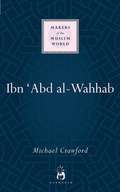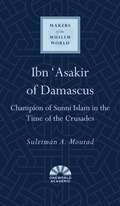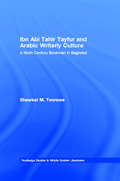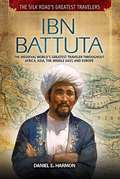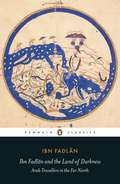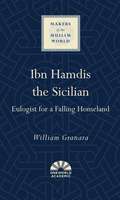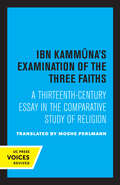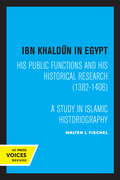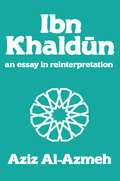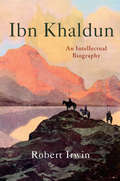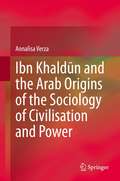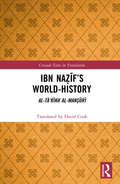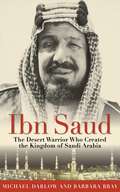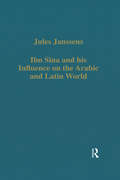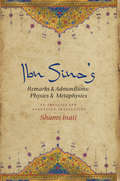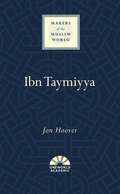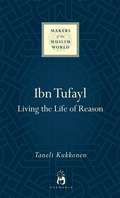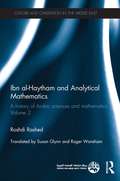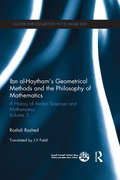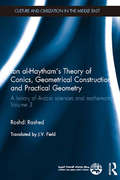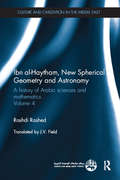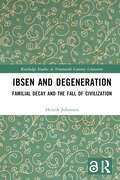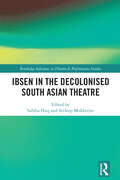- Table View
- List View
Ibn 'Abd al-Wahhab (Makers of the Muslim World)
by Michael CrawfordMuhammad ibn 'Abd al-Wahhab (1703-1792) aroused great controversy in his lifetime. More than two centuries after his death, he still elicits strong views. For some he is the model of a pious religious activist who fought to establish a regime of Islamic godliness in the least promising of environments. For others, especially Muslims associated with mystic orders or who belong to the Shi'i branch of Islam, he is a hate figure. Few would contest that he shaped the Muslim world. For over 250 years the Wahhabi movement has rested on the twin pillars of a clear, compelling credo and an indissoluble alliance with temporal power. Absolutist, uncompromising theology and political and religious ambition combined to make it the dominant force in Arabia, turning its champions, the Al Sa'ud clan, from petty rulers of a mid-sized settlement into the guardians of Islam's Holy Places, disposing of the earth's greatest identified oil reserves. This thought-provoking and comprehensive biography, which charts the relationship between religious doctrine, political power, and events on the ground, uncovers the life and thoughts of the man who helped establish the first Saudi state and who began a dynastic alliance that continues to the present day.
Ibn 'Asakir of Damascus: Champion of Sunni Islam in the Time of the Crusades (Makers of the Muslim World)
by Suleiman A. Mourad&‘Ali ibn &‘Asakir (1105–1176) was one of the most renowned experts on Hadith and Islamic history in the medieval era. His was a tumultuous time: centuries of Shi&‘i rule had not long ended in central Syria, rival warlords sought control of the capital, and Crusaders had captured Jerusalem. Seeking the unification of Syria and Egypt, and the revival of Sunnism in both, Ibn &‘Asakir served successive Muslim rulers, including Nur al-Din and Saladin, and produced propaganda against both the Christian invaders and the Shi&‘is. This, together with his influential writings and his advocacy of major texts, helped to lay the foundations for the eventual Sunni domination of the Levant – a domination which continues to this day.
Ibn Abi Tahir Tayfur and Arabic Writerly Culture: A Ninth Century Bookman in Baghdad (Routledge Studies in Middle Eastern Literatures #Vol. 7)
by Shawkat M. ToorawaToorawa re-evaluates the literary history and landscape of third to ninth century Baghdad by demonstrating and emphasizing the significance of the important transition from a predominantly oral-aural culture to an increasingly literate one. This transformation had a profound influence on the production of learned and literary culture; modes of transmission of learning; nature and types of literary production; nature of scholarly and professional occupations and alliances; and ranges of meanings of certain key concepts, such as plagiarism. In order to better understand these, attention is focused on a central but understudied figure, Ibn Abi Tahir Tayfur (d. 280 to 893), a writer, schoolmaster, scholar and copyist, member of important literary circles, and a significant anthologist and chronicler. This book will appeal to anyone interested in Arabic literary culture and history, and those with an interest in books, writing, authorship and patronage.
Ibn Battuta: The Medieval World's Greatest Traveler throughout Africa, Asia, the Middle East, and Europe, First Edition (The Silk Road's Greatest Travelers )
by Daniel E. HarmonIbn Battuta, a fourteenth-century Moroccan adventurer and religious scholar, was one of the most ambitious travelers of the Silk Road. Scholars estimate his lifelong journeys covered no fewer than 75,000 miles. Because of his knowledge of Muslim history and laws, he was greatly respected by the Muslim rulers he visited. His geographical records helped fill in the pieces of a mysterious world.
Ibn Fadlan and the Land of Darkness: Arab Travellers in the Far North
by Ibn FadlanIn 922 AD, an Arab envoy from Baghdad named Ibn Fadlan encountered a party of Viking traders on the upper reaches of the Volga River. In his subsequent report on his mission he gave a meticulous and astonishingly objective description of Viking customs, dress, table manners, religion and sexual practices, as well as the only eyewitness account ever written of a Viking ship cremation.Between the ninth and fourteenth centuries, Arab travellers such as Ibn Fadlan journeyed widely and frequently into the far north, crossing territories that now include Russia, Uzbekistan and Kazakhstan. Their fascinating accounts describe how the numerous tribes and peoples they encountered traded furs, paid tribute and waged wars. This accessible new translation offers an illuminating insight into the world of the Arab geographers, and the medieval lands of the far north.
Ibn Gabirol's Theology of Desire
by Sarah PessinDrawing on Arabic passages from Ibn Gabirol's original Fons Vitae text, and highlighting philosophical insights from his Hebrew poetry, Sarah Pessin develops a "Theology of Desire" at the heart of Ibn Gabirol's eleventh-century cosmo-ontology. She challenges centuries of received scholarship on his work, including his so-called Doctrine of Divine Will. Pessin rejects voluntarist readings of the Fons Vitae as opposing divine emanation. She also emphasizes Pseudo-Empedoclean notions of "Divine Desire" and "Grounding Element" alongside Ibn Gabirol's use of a particularly Neoplatonic method with apophatic (and what she terms "doubly apophatic") implications. In this way, Pessin reads claims about matter and God as insights about love, desire, and the receptive, dependent, and fragile nature of human being. Pessin reenvisions the entire spirit of Ibn Gabirol's philosophy, moving us from a set of doctrines to a fluid inquiry into the nature of God and human being - and the bond between God and human being in desire.
Ibn Hamdis the Sicilian: Eulogist for a Falling Homeland (Makers of the Muslim World)
by William Granara&‘Abd al-Jabbar ibn Hamdis (1055–1133) survives as the best-known figure from four centuries of Arab-Islamic civilisation on the island of Sicily. There he grew up in a society enriched by a century of cultural development but whose unity was threatened by competing warlords. After the Normans invaded, he followed many other Muslims in emigrating, first to North Africa and then to Seville, where he began his career as a court poet. Although he achieved fame and success in his time, Ibn Hamdis was forced to bear witness to sectarian strife among the Muslims of both Sicily and Spain, and the gradual success of the Christian reconquest, including the decline of his beloved homeland. Through his verse, William Granara examines his life and times.
Ibn Kammuna's Examination of the Three Faiths: A Thirteenth-Century Essay in the Comparative Study of Religion
by Moshe PerlmannThis title is part of UC Press's Voices Revived program, which commemorates University of California Press’s mission to seek out and cultivate the brightest minds and give them voice, reach, and impact. Drawing on a backlist dating to 1893, Voices Revived makes high-quality, peer-reviewed scholarship accessible once again using print-on-demand technology. This title was originally published in 1971.
Ibn Khaldun in Egypt: His Public Functions and His Historical Research (1382-1406): A Study in Islamic Historiography
by Walter J. FischelThis title is part of UC Press's Voices Revived program, which commemorates University of California Press’s mission to seek out and cultivate the brightest minds and give them voice, reach, and impact. Drawing on a backlist dating to 1893, Voices Revived makes high-quality, peer-reviewed scholarship accessible once again using print-on-demand technology. This title was originally published in 1967.
Ibn Khaldun: A Reinterpretation (Arabic Thought and Culture)
by Aziz Al-AzmehA reinterpretation of Ibn Khaldun, 14th-century Arabic philosopher, historian and politician.
Ibn Khaldun: An Intellectual Biography
by Robert IrwinThe definitive account of the life and thought of the medieval Arab genius who wrote the MuqaddimaIbn Khaldun (1332–1406) is generally regarded as the greatest intellectual ever to have appeared in the Arab world--a genius who ranks as one of the world's great minds. Yet the author of the Muqaddima, the most important study of history ever produced in the Islamic world, is not as well known as he should be, and his ideas are widely misunderstood. In this groundbreaking intellectual biography, Robert Irwin provides an engaging and authoritative account of Ibn Khaldun's extraordinary life, times, writings, and ideas. Irwin tells how Ibn Khaldun, who lived in a world decimated by the Black Death, held a long series of posts in the tumultuous Islamic courts of North Africa and Muslim Spain, becoming a major political player as well as a teacher and writer. Closely examining the Muqaddima, a startlingly original analysis of the laws of history, and drawing on many other contemporary sources, Irwin shows how Ibn Khaldun's life and thought fit into historical and intellectual context, including medieval Islamic theology, philosophy, politics, literature, economics, law, and tribal life. Because Ibn Khaldun's ideas often seem to anticipate by centuries developments in many fields, he has often been depicted as more of a modern man than a medieval one, and Irwin's account of such misreadings provides new insights about the history of Orientalism.In contrast, Irwin presents an Ibn Khaldun who was a creature of his time—a devout Sufi mystic who was obsessed with the occult and futurology and who lived in an often-strange world quite different from our own.
Ibn Khaldūn and the Arab Origins of the Sociology of Civilisation and Power
by Annalisa VerzaThis book presents Ibn Khaldūn's anticipatory sociology of civilisations and power. Half a millennium before the birth of modern sociology in the West, Ibn Khaldūn—scholar, political counsellor, and Malikite judge—wrote a revolutionary sociological-philosophical treatise, the Muqaddima. This book places his broad, complex, and refined treatise against the background of the Islamo-Greek culture of his time and analyses its main sociological, but also philosophical, historical, and scientific perspectives. Finally, thanks to its "universalisable" core, the author recontextualizes the teachings from the Muqaddima to reveal the deep insights it provides into the society, politics and law of contemporary liberal and multicultural civilisations. A deeper reception of Ibn Khaldūn's perspective is not only important in understanding the Arab contribution to social theory, social history and philosophy, but also diversifies the sociological project beyond the Euro-American standpoint. Given its interdisciplinary appeal, the book addresses a wide readership of students and scholars in sociology, the sociology of law, philosophy of law, philosophy of history, political philosophy, history of civilisations, political sociology, and Arabic studies.
Ibn Naẓīf’s World-History: Al-Tā’rīkh al-Manṣūrī (Crusade Texts in Translation)
by David CookThis book is the first translated and annotated edition of Ibn Naẓīf’s Al-Tā’rīkh al-Manṣūrī. Totalling 227 folios, the manuscript is a unique and valuable source full of historical accounts and anecdotes. The documents include two letters by the Emperor Frederick II in Arabic, as well as the only mention of the Albigensian Crusade in the Arabic language. Other notable material includes Ibn Naẓīf’s notes concerning the rivalries between the various Ayyūbids and the wars against Jalāl al-Dīn Mangubirtī, descriptions of the Ayyūbids in Yemen, and notes on the destruction of the Sicilian Muslims and the defeats of the Spanish Muslims. Containing an extensive historical introduction, this book will appeal to scholars and students interested in the later Crusader and middle Ayyūbid periods.
Ibn Saud: The Desert Warrior Who Created the Kingdom of Saudi Arabia
by Barbara Bray Michael DarlowIbn Saud grew to manhood living the harsh traditional life of the desert nomad, a life that had changed little since the days of Abraham. Equipped with immense physical courage, he fought and won, often with weapons and tactics not unlike those employed by the ancient Assyrians, a series of astonishing military victories over a succession of enemies much more powerful than himself. Over the same period, he transformed himself from a minor sheikh into a revered king and elder statesman, courted by world leaders such as Churchill and Roosevelt. A passionate lover of women, Ibn Saud took many wives, had numerous concubines, and fathered almost one hundred children. Yet he remained an unswerving and devout Muslim, described by one who knew him well at the time of his death in 1953 as "probably the greatest Arab since the Prophet Muhammad." Saudi Arabia, the country Ibn Saud created, is a staunch ally of the West, but it is also the birthplace of Osama bin Laden and fifteen of the nineteen 9/11 hijackers. Saud's kingdom, as it now stands, has survived the vicissitudes of time and become an invaluable player on the world's political stage.
Ibn Sina and his Influence on the Arabic and Latin World (Variorum Collected Studies)
by Jules JanssensThis volume focuses on Ibn Sina - the Avicenna of the Latin West - and the enormous impact of his philosophy in both the Islamic and Christian worlds. Jules Janssens opens with a new introductory article, surveying the position of work in the field. The next studies look at Ibn Sina's work and thought, inspired by Alexandrian Neoplatonism on the one hand, and the Qur'an on the other, notably his views on the relationship between God and the world, within the context of Islam. There follow explorations of Ibn Sina's influence on later philosophers, first within the Islamic world and with particular reference to al-Ghazzali, but also, once translated into Latin, in the scholastic world of the West, on figures such as Albert the Great, Thomas Aquinas, and above all Henry of Ghent.
Ibn Sina's Remarks and Admonitions: Physics and Metaphysics
by Shams C. InatiAl-Isharat wat-Tanbihat ( Remarks and Admonitions) is one of the most mature and comprehensive philosophical works of Ibn Sina (Avicenna, 980--1037). Grounded in an exploration of logic (which Ibn Sina described as the gate to knowledge) and happiness (the ultimate human goal), the text illuminates the divine, the human being, and the nature of things through a wide-ranging discussion of topics. The sections of Physics and Metaphysics deal with the nature of bodies and souls as well as existence, creation, and knowledge. Especially important are Ibn Sina's views of God's knowledge of particulars, which generated much controversy in medieval Islamic and Christian philosophical and theological circles and provoked a strong rejection by eleventh-century philosopher al-Ghazali.This book provides the first annotated English translation of Physics and Metaphysics and edits the original Arabic text on which the translation is based where it is corrupt or incomprehensible. It begins with a detailed analysis of the text, followed by a translation of the three classes or groups of ideas in the Physics (On the Substance of Bodies; On the Directions and Their Primary and Secondary Bodies; and On the Terrestrial and Celestial Souls) and the four in the Metaphysics (On Existence and Its Causes; Creation Ex Nihilo and Immediate Creation; On Ends, on Their Principles, and on the Arrangement [of Existence]; and On Abstraction. The Metaphysics closes with a significant discussion of the concepts of providence, good, and evil, which Ibn Sina uses to introduce a theodicy.Researchers, faculty, and students in philosophy, theology, religion, and intellectual history will find in this work a useful and necessary source for understanding Ibn Sina's philosophical thought and more generally the medieval Islamic and Christian study of nature, the world beyond, psychology, God, and the concept of evil.
Ibn Sina’s Remarks and Admonitions: An Analysis and Annotated Translation
by Shams C. InatiAl-Isharat wal-Tanbihat (Remarks and Admonitions) is one of the most mature and comprehensive philosophical works by Ibn Sina (Avicenna, 980–1037). Grounded in an exploration of logic (which Ibn Sina described as the gate to knowledge) and happiness (the ultimate human goal), the text illuminates the divine, the human being, and the nature of things through a wide-ranging discussion of topics. The sections of Physics and Metaphysics deal with the nature of bodies and souls as well as existence, creation, and knowledge. Especially important are Ibn Sina's views of God's knowledge of particulars, which generated much controversy in medieval Islamic and Christian philosophical and theological circles and provoked a strong rejection by eleventh-century philosopher al-Ghazali.This book provides the first annotated English translation of Physics and Metaphysics and edits the original Arabic text on which the translation is based. It begins with a detailed analysis of the text, followed by a translation of the three classes or groups of ideas in the Physics (On the Substance of Bodies, On the Directions and Their Primary and Secondary Bodies, and On the Terrestrial and Celestial Souls) and the four in the Metaphysics (On Existence and Its Causes, Creation Ex Nihilo and Immediate Creation, On Ends, on Their Principles, and on the Arrangement [of Existence], and On Abstraction. The Metaphysics closes with a significant discussion of the concepts of providence, good, and evil, which Ibn Sina uses to introduce a theodicy.Researchers, faculty, and students in philosophy, theology, religion, and intellectual history will find in this work a useful and necessary source for understanding Ibn Sina's philosophical thought and, more generally, the medieval Islamic and Christian study of nature, the world beyond, psychology, God, and the concept of evil.
Ibn Taymiyya (Makers of the Muslim World #73)
by Jon HooverIbn Taymiyya (1263–1328) of Damascus was one of the most prominent and controversial religious scholars of medieval Islam. He called for jihad against the Mongol invaders of Syria, appealed to the foundational sources of Islam for reform, and battled against religious innovation. Today, he inspires such diverse movements as Global Salafism, Islamic revivalism and modernism, and violent jihadism. This volume synthesizes the latest research, discusses many little-known aspects of Ibn Taymiyya&’s thought, and highlights the religious utilitarianism that pervades his activism, ethics, and theology.
Ibn Tufayl: Living the Life of Reason (Makers of the Muslim World)
by Taneli KukkonenIbn Tufayl (1105-1185) was an Andalusian courtier, philosopher, Sufi master, and royal physician to the Almohad Caliphs. He inspired the 12th-century Andalusian revolt against Ptolemaic astronomy and through his sponsorship he was also responsible for the career of the most renowned Aristotelian of medieval times, Abu al-Walid Ibn Rushd (the Latin Averroes). In Ibn Tufayl, we see an exemplar of the kind of versatile and pious scholar early Almohad culture wanted to cultivate.Ibn Tufayl's own intellectual outlook is preserved for us in Hayy Ibn Yaqzan, a philosophical romance that is one of the most beloved and best read pieces in all Arabic literature. A popular and often-copied work in early modern Europe, Hayy has for many come to represent what is distinctive of high classical Arabic philosophy. Ibn Tufayl sets one of the most famous Arabic philosophical works of all time in its historical and philosophical context: it paints a vivid portrait of the world as Ibn Tufayl saw it and as he wished for it to be seen.
Ibn al-Haytham and Analytical Mathematics: A History of Arabic Sciences and Mathematics Volume 2 (Culture and Civilization in the Middle East)
by Roshdi RashedThis volume provides a unique primary source on the history and philosophy of mathematics and the exact sciences in the mediaeval Arab world. The second of five comprehensive volumes, this book offers a detailed exploration of Arabic mathematics in the eleventh century as embodied in the legacy of the celebrated polymath al-Hasan ibn al-Haytham. Extensive analyses and annotations from the eminent scholar, Roshdi Rashed, support a number of key Arabic texts from Ibn al-Haytham’s treatises in infinitesimal mathematics, translated here into English for the first time. Rashed shows how Ibn al-Haytham’s works demonstrate a remarkable mathematical competence in mathematical subjects like the quadrature of the circle and of lunes, the calculation of the volumes of paraboloids, the problem of isoperimetric plane figures and solid figures with equal surface areas, along with the extraction of square and cubic roots. The present text is complemented by the first volume of A History of Arabic Sciences and Mathematics, which focused on founding figures and commentators in the ninth and tenth centuries Archimedean-Apollonian mathematical ‘School of Baghdad’. This constellation of works illustrates the historical and epistemological development of ‘infinitesimal mathematics’ as it became clearly articulated in the oeuvre of Ibn al-Haytham. Contributing to a more informed and balanced understanding of the internal currents of the history of mathematics and the exact sciences in Islam, and of its adaptive interpretation and assimilation in the European context, this fundamental text will appeal to historians of ideas, epistemologists and mathematicians at the most advanced levels of research.
Ibn al-Haytham's Geometrical Methods and the Philosophy of Mathematics: A History of Arabic Sciences and Mathematics Volume 5 (Culture and Civilization in the Middle East)
by Roshdi Rashed and J. V. FieldThis fifth volume of A History of Arabic Sciences and Mathematics is complemented by four preceding volumes which focused on the main chapters of classical mathematics: infinitesimal geometry, theory of conics and its applications, spherical geometry, mathematical astronomy, etc. This book includes seven main works of Ibn al-Haytham (Alhazen) and of two of his predecessors, Thābit ibn Qurra and al-Sijzī: The circle, its transformations and its properties; Analysis and synthesis: the founding of analytical art; A new mathematical discipline: the Knowns; The geometrisation of place; Analysis and synthesis: examples of the geometry of triangles; Axiomatic method and invention: Thābit ibn Qurra; The idea of an Ars Inveniendi: al-Sijzī. Including extensive commentary from one of the world’s foremost authorities on the subject, this fundamental text is essential reading for historians and mathematicians at the most advanced levels of research.
Ibn al-Haytham's Theory of Conics, Geometrical Constructions and Practical Geometry: A History of Arabic Sciences and Mathematics Volume 3 (Culture and Civilization in the Middle East)
by Roshdi RashedTheory of Conics, Geometrical Constructions and Practical Geometry: A History of Arabic Sciences and Mathematics Volume 3, provides a unique primary source on the history and philosophy of mathematics and science from the mediaeval Arab world. The present text is complemented by two preceding volumes of A History of Arabic Sciences and Mathematics, which focused on founding figures and commentators in the ninth and tenth centuries, and the historical and epistemological development of ‘infinitesimal mathematics’ as it became clearly articulated in the oeuvre of Ibn al-Haytham. This volume examines the increasing tendency, after the ninth century, to explain mathematical problems inherited from Greek times using the theory of conics. Roshdi Rashed argues that Ibn al-Haytham completes the transformation of this ‘area of activity,’ into a part of geometry concerned with geometrical constructions, dealing not only with the metrical properties of conic sections but with ways of drawing them and properties of their position and shape. Including extensive commentary from one of world’s foremost authorities on the subject, this book contributes a more informed and balanced understanding of the internal currents of the history of mathematics and the exact sciences in Islam, and of its adaptive interpretation and assimilation in the European context. This fundamental text will appeal to historians of ideas, epistemologists and mathematicians at the most advanced levels of research.
Ibn al-Haytham, New Astronomy and Spherical Geometry: A History of Arabic Sciences and Mathematics Volume 4 (Culture and Civilization in the Middle East)
by Roshdi RashedThis volume provides a unique primary source on the history and philosophy of mathematics and science from the mediaeval Arab world. The fourth volume of A History of Arabic Sciences and Mathematics is complemented by three preceding volumes which focused on infinitesimal determinations and other chapters of classical mathematics. This book includes five main works of the polymath Ibn al-Haytham (Alhazen) on astronomy, spherical geometry and trigonometry, plane trigonometry and studies of astronomical instruments on hour lines, horizontal sundials and compasses for great circles. In particular, volume four examines: the increasing tendency to mathematize the inherited astronomy from Greek sources, namely Ptolemy's Almagest; the development of celestial kinematics; new research in spherical geometry and trigonometry required by the new kinematical theory; the study on astronomical instruments and its impact on mathematical research. These new historical materials and their mathematical and historical commentaries contribute to rewriting the history of mathematical astronomy and mathematics from the 11th century on. Including extensive commentary from one of the world’s foremost authorities on the subject, this fundamental text is essential reading for historians and mathematicians at the most advanced levels of research.
Ibsen and Degeneration: Familial Decay and the Fall of Civilization (Routledge Studies in Nineteenth Century Literature)
by Henrik JohnssonHenrik Ibsen’s plays were written at a critical juncture in late-19th-century European culture. Appearing at a time when notions of evolution and heredity were commonplace themes in literature and the arts, Ibsenian drama highlights the creative potential offered by contemporary evolutionary thought. In his plays, Ibsen explores variations on the theme of degeneration, imagining how families can become affected by ill-health or other forms of “weakness” that lead to the extinction of the family line. Ibsen and Degeneration looks at the recurrence of ideas of degeneration in three of Ibsen’s plays: In Ghosts, it is the motif of syphilis, highly shocking to Ibsen’s contemporaries, which serves as an allegory of degeneration. In Rosmersholm, degeneration is reconfigured as an overcultivation that eventually makes a family unfit for life. In Hedda Gabler, meanwhile, Hedda, having been for all practical purposes raised as a man, has come to think of herself as one, a circumstance which informs her final decision to end her life – her final degeneration. By reading these three plays from a fresh perspective, Ibsen and Degeneration sheds new light on some of Ibsen’s most enduring contributions to world drama.The Open Access version of this book, available at http://www.taylorfrancis.com, has been made available under a Creative Commons Attribution-Non Commercial-No Derivatives (CC-BY-NC-ND) 4.0 license.
Ibsen in the Decolonised South Asian Theatre (Routledge Advances in Theatre & Performance Studies)
by Sabiha Huq Srideep MukherjeeThis book maps South Asian theatre productions that have contextualised Ibsen’s plays to underscore the emergent challenges of postcolonial nation formation. The concerns addressed in this collection include politico-cultural engagements with human rights, economic and environmental issues, and globalisation, all of which have evolved through colonial times and thereafter. This book contemplates why and how these Ibsen texts were repeatedly adapted for the stage and consequently reflects upon the political intent of this appropriative journey of the foreign playwright. This book tracks the unmapped agency that South Asian theatre has acquired through aesthetic appropriation of Ibsen and thereby contributes to his global reception. This collection will be of great interest to students and scholars of theatre and performance studies.
